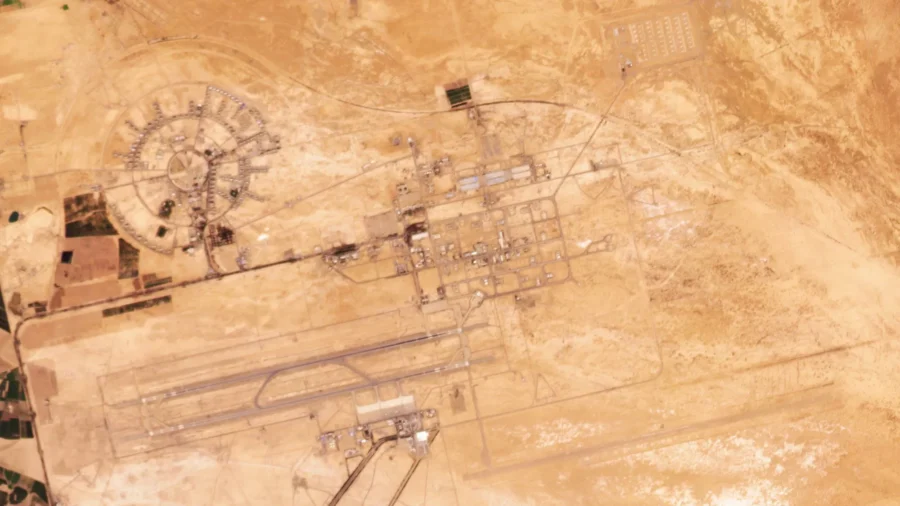Flights in western Iran began diverting amid reports of “loud noise” and “explosions” early on April 19, according to Iranian media.
Soon after, the Australian government issued a warning for any of its citizens in Israel or “occupied Palestinian territories” to depart as soon as possible, citing a “high threat of military reprisals and terrorist attacks against Israel and Israeli interests across the region.”
The country’s foreign affairs department stated that due to “military attacks” that may close the airspace, Tel Aviv’s Ben Gurion International Airport “may pause operations due to heightened security concerns at any time, and at short notice.”
At least one U.S. media outlet has quoted an anonymous U.S. official apparently confirming that Israel carried out a strike in Iran. When contacted by The Epoch Times for further information, the Pentagon said: “We do not have anything to offer at this time.”
Israel has not confirmed whether it launched an attack. The Epoch Times has contacted Israel’s military for comment.
Dubai-based airlines Emirates and FlyDubai diverted flights around western Iran around 4:30 a.m. local time without explanation. Flight Radar 24, a website monitoring live air traffic, shows flights avoiding western Iran at around 6 a.m. local time.
The semi-official Fars news agency, citing unnamed sources, reported the sound of explosions over Isfahan, near its international airport. However, it offered no immediate explanation. Isfahan is home to a significant airbase for the Iranian military, as well as sites linked to its nuclear program.
Iranian state television issued a scrolling on-screen alert acknowledging a “loud noise” near Isfahan but did not provide immediate elaboration.
The incident unfolds against the backdrop of heightened tensions in the Middle East following Iran’s unprecedented missile-and-drone attack on Israel on April 13.
That strike came in response to what Iran said was an Israeli airstrike that killed military officers at the Iranian embassy in Syria on April 1. Israel did not claim responsibility for the strike.
Prior to news of “explosions” heard in Iran, Iranian Foreign Minister Hossein Amir-Abdollahian, on the night of April 18, threatened Israel with an “immediate” and “maximum” response if it took any military action against Iran.
“In case the Israeli regime embarks on adventurism again and takes action against the interests of Iran, the next response from us will be immediate and at a maximum level,” Mr. Amir-Abdollahian told CNN.
Mr. Amir-Abdollahian said that Iran had told the White House that if “the Israeli regime commits the great error once again our response will be decisive, definitive and regretful for them.”
On April 17, Israeli Prime Minister Benjamin Netanyahu announced that his country would make its own decisions about how to protect itself, disregarding the calls for restraint from some Western countries. This statement was made in response to the Iranian missile and drone attacks, which were largely intercepted by Israel and the United States.
“I want to make it clear: We will make our own decisions, and the State of Israel will do everything necessary to defend itself,” Mr. Netanyahu told the foreign ministers of Germany and the United Kingdom.
The German foreign minister, Annalena Baerbock, had told the Israeli leader that escalation “would serve no one, not Israel’s security, not the many dozens of hostages still in the hands of Hamas, not the suffering population of Gaza, not the many people in Iran who are themselves suffering under the regime, and not the third countries in the region who simply want to live in peace.”
Speaking at an annual army parade on April 17, Iranian President Ebrahim Raisi described the country’s attack on Israel as “limited.” He claimed “there would be nothing left of the Zionist regime” in Israel if Iran had wanted to carry out more attacks than it did.
“That is the time when the supporters of the Zionist regime will find out that their hidden power will not be able to do anything,” Mr. Raisi said, according to a transcript published on his website.
The Iranian leader warned of a further “massive and harsh” response should Israel invade Iran “in any way.”
This is a developing story.
The Associated Press contributed to this report.
From The Epoch Times


